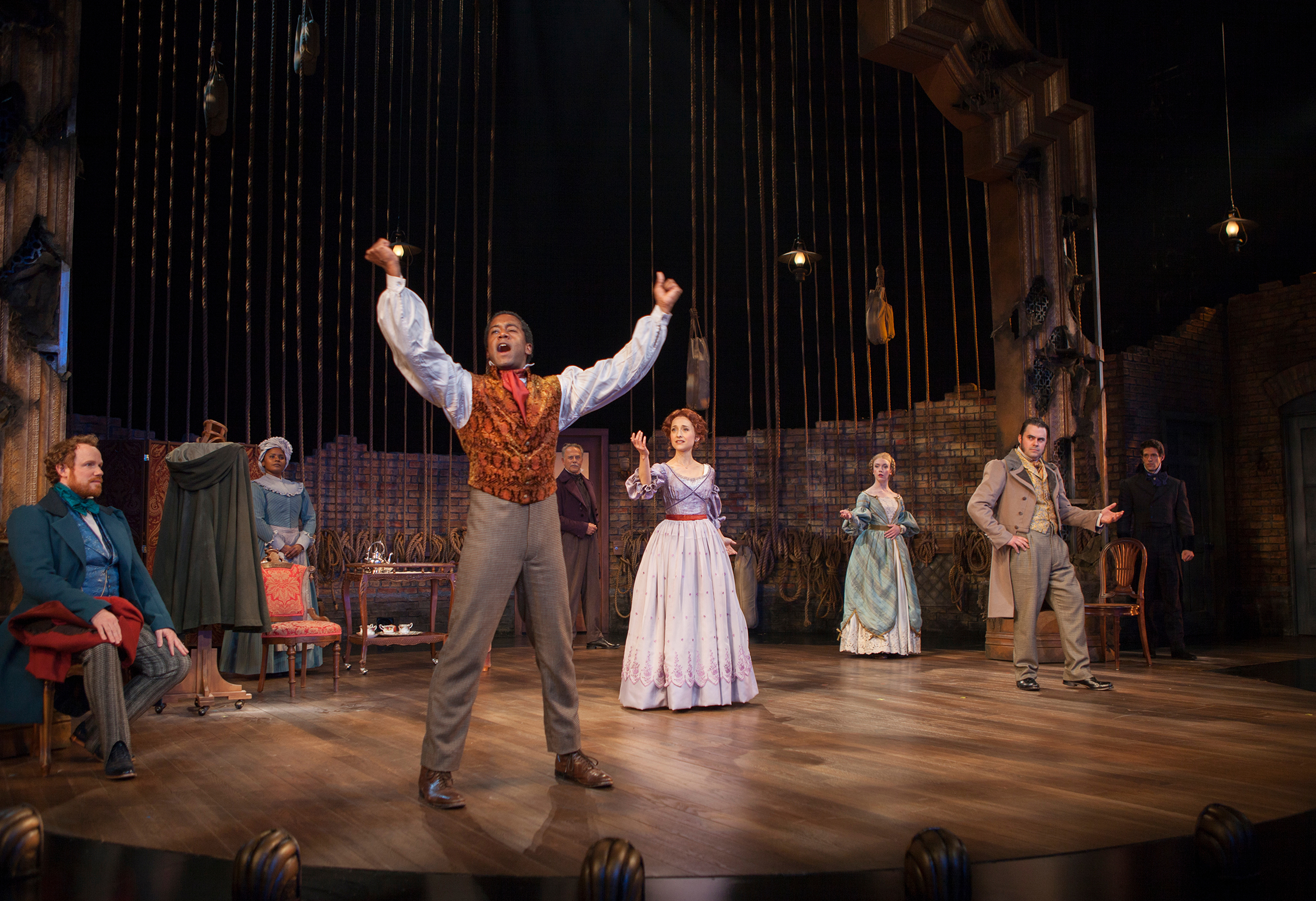

In the annals of African American theatre, names like Paul Robeson, Ossie Davis, James Earl Jones and Sidney Poitier leap to mind. But each of these iconic figures would undoubtedly be the first to tell of one of their little known and tragically unrecognized forbears upon whose huge shoulders they stood. Remarkably, Ira Aldridge, a 19th century African American actor, one of the greatest Shakespearean actors of his day, who stood at the center of controversy in England when he became the first Black actor to play Othello on the English stage, is one of those, in current parlance, “hidden figures,” too long ignored. His pioneering achievements in the world of theatre—and the struggles he endured–is brought powerfully to light in the Old Globe’s current production “Red Velvet.” Written by Lolita Chakrabarti and directed by Stafford Arima, the multi-layered play is part historical drama, part social commentary, and at its core, is a revealing story of, against all odds, pursuing and achieving a dream, reminding that in spite of obstacles, talent triumphs.
“Red Velvet” is also a story of contradictions: a man who was the highest paid actor in Russia, who, when he died on tour in Poland, was given a state funeral, but whose mighty acting talent was reduced to dehumanizing insult simply because of the color of his skin.
Born in New York in 1807, Ira Aldridge, like many African American artists of his day and later, found more opportunities abroad, establishing himself throughout Europe. The story turns on two major phases in his life: in the opening and closing scenes in 1867 in Poland, as a man of 60 being questioned by a female reporter on a pivotal moment in his life; and then, in flashback, that moment explored, in 1833, when he is called to take over the role of Othello at the Theatre Royal in Covent Garden from the legendary Edmund Kean, after the actor collapses onstage. All takes place in the context of 19th century England, where the long shadow of slavery cast its insidious net. One could feel a collective bristle rise throughout the audience when, after Aldridge’s iconoclastic performance, reviews are read aloud with blatant racially charged language that are frankly unprintable in this publication.
The play features a talented troupe of actors, led by Albert Jones as Aldridge, who cuts a charismatic figure, moving across the stage with alluring grace, portraying strength, tenderness and rage as his journey, both artistic and personal, moves through tempests, calms and storms. He is especially regal when donning the robe of Othello in the Shakespearean drama’s compelling handkerchief scene with Ellen Tree (winsome, with magnetic charm Allison Mack), his Desdemona, one of the most gripping and intricately executed scenes in the play. Also exceptional was the revealing, masterfully choreographed confrontation between Aldridge and theatre manager Pierre Laporte (Sean Dugan), with Laporte condemning Aldridge’s performance: “You act like a one man brigade. You run at the wall and when you fall you…just keep charging.” Ironically, what gives Aldridge his strength becomes his liability. Kudos go to the entire cast, especially to Monique Gaffney, a gem in the San Diego theatre community, who turns in a fine performance as Connie, a servant whose proud stride, even as she cleans counters and polishes dishes in the background, suggests a conscience to a shadowy history.
In the hands of Jason Sherwood, Red Velvet’s scenic design is a thing of beauty with a sumptuous period-set; and scene changes, elegantly accompanied by evocative music, become magical performance pieces in themselves.
Sadly, talent without access can be a killer of the human spirit. The threat looms heavy in the play’s final scene, becoming a bitter pill to swallow. But thankfully, through this production and other literary and historical renderings, Aldridge’s spirit and legacy is vindicated. He is a man who, says Adrian Lester, the award-winning British actor who originated the role in 2012, was “a one-man case for the abolition movement and a pioneer for black actors.”
Even among theatre professionals, many confess to not having heard of Ira Aldridge prior to “Red Velvet,” including the show’s original London director Indhu Rubasingham (a notable exception is San Diego’s Calvin Manson, whose Ira Aldridge Repertory players (IARP) have brought meaningful African American-themed productions to San Diego audiences since 1984).
Like the three female African American NASA mathematicians of the 1960’s whose achievements belatedly came to light in the movie “Hidden Figures,” Chakrabarti’s timely “Red Velvet” illuminates a courageous, groundbreaking, perhaps flawed—but who among us is not—figure in theatre history whose story should be known to wider audiences. And with the Old Globe’s fine production, it finally is. “Red Velvet” runs through April 30. For ticket information, visit www.theoldglobe.org.


